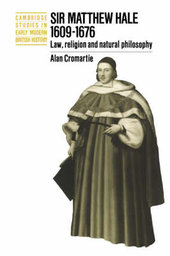
|
Sir Matthew Hale, 1609-1676: Law, Religion and Natural Philosophy
Hardback
Main Details
Description
Sir Matthew Hale (1609-76) was the best-known judge of the Commonwealth under Oliver Cromwell, but he nonetheless rose to be Lord Chief Justice under King Charles II. His constitutional ideas are of interest both to lawyers and to historians of political thought; but he also wrote extensively on scientific and religious questions, in ways that illustrate the birth of early Enlightenment attitudes to both. This book surveys all aspects of Hale's work, and supplies fresh perspectives on revolutionary developments in science and religion, as well as politics.
Reviews"This is a very thoughtful and intelligent book. It offers fresh and important insights, not just into the mind of Sir Matthew Hale but into the intellectual world he inhabited." American Historical Review "Cromartie has provided a solid introduction to an important figure and drawn attention to the very significant conjunctions in Stuart England of law, religion, and natural philosophy..." ISIS "Cromartie's work...will be of interest to all specialists in seventeenth-century English legal, religious, and intellectual histroy. Cambridge University Press is to be commended as one of the few contemporary scholarly publishers to provide adequate bibliographies." Sixteenth Century Journal "Although this study will be of most value to those concerned with the relationship between legal culture and constitutional thought, it also assists us in understanding the development of lay latitudinarianism and the motivations for the widespread Restoration interest in natural philosophy." Albion "Hale's thought illuminates the resilience of English constitutionalism." Marilyn Morris, Religious Studies Review "...Sir Matthew Hale 1609-1676 provides a remarkably thorough examination of the major aspects of Hale's professional and intellectual life...A book of this lenghth of course, cannot cover everything in the writings of such a prolific author, but it provides an extremely able introduction to the career and ideas of a leading jurist." Paul Christianson, Canadian Journal of History "...a valuable and interesting book." J. Sears McGee, Church History "Alan Cromartie deserves praise and thanks for a book which is well researched, crisply written and full of fascinating insights...certainly essential reading for anyone interested in the history of law and lawyers during the period." Christopher Brooks, The American Journal of Legal History
|